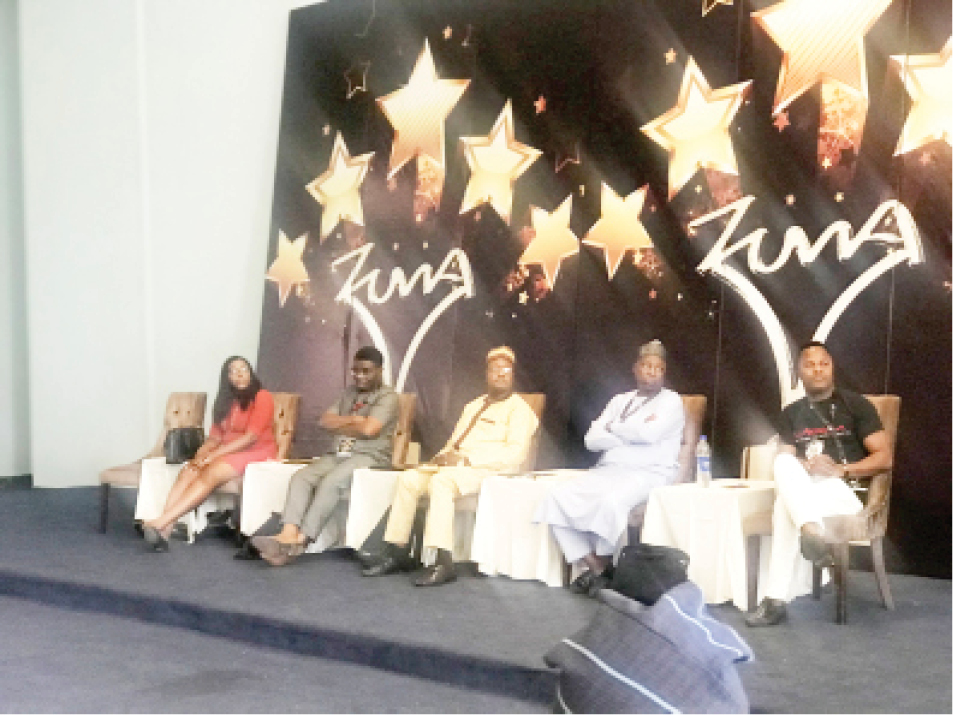Zuma Film Festival, where every view counts
This festival which held from December 1 to 7 in Abuja had a lot to offer. But what made it stand out? A film festival is generally a showcase affair that includes screenings and talks with the people and brains behind certain productions. The Zuma Film Festival (ZUFF), sponsored by the Nigerian Film Corporation (NFC) […]

From right: Mr. Alex Eyenko, Mallam Abdulkareem Mohammed, Mallam Sanni Mohazu, Mr. Victor Okahi, and Ijeoma Ebibu
This festival which held from December 1 to 7 in Abuja had a lot to offer. But what made it stand out?
A film festival is generally a showcase affair that includes screenings and talks with the people and brains behind certain productions. The Zuma Film Festival (ZUFF), sponsored by the Nigerian Film Corporation (NFC) was no different, if not more. Themed ‘Content Connectivity: Every view, Everywhere,’ it explored strategies upcoming filmmakers could employ to break into the motion pictures market. It also connected students from over seven institutions in Nigeria. These included those from Nigerian Film Institute, Nassarawa State College of Education, Kano State University, University of Abuja, and University of Jos, to mention a few, who were invited to represent their schools at the event.
The weeklong festival which began on Sunday, December 1 and ended on Saturday, December 7 in Abuja was officially opened with a light-up night and screening of three Nigerian films. Its partnership with Google afforded it the opportunity to hold a week-long lecture (themed ‘Emerging Talents Workshop’) during the day and film shows in the evenings.
A student of Nassarawa State College of Education, Alose Dennis, who is from the Theatre Arts Department expressed his delight at how much he had learned. “It has been a lot of experience and learning. I have learnt about film making and the challenges the filmmakers face to make good films. This festival which is also in collaboration with YouTube has helped and encouraged me to create my YouTube account. It has given me a platform to showcase my skills and put myself out there. It has also given upcoming creators a chance to be known.” He said.
The festival screened a total of 29 films directed by Nigerians and others from countries such as Italy, Philippines, Spain, Uganda, South Africa, Czech Republic, Canada, Brazil, Australia, France, Switzerland, India and Greece. Wale Adesanya, the director of ‘Almost Perfect’, one of the films screened said, “Every piece of art is interpreted differently. A picture tells the story of a thousand words. So, it is okay for everyone to have different views about a film which aims at provoking a reaction. Filmmaking is not a competition. You don’t have to wait till you are inspired to shoot.”
Adesanya also explained that his movie’s genre is comedy infused with real life issues. The film was comical and at the same time educative and informative. Its plot presented a political problem and went on to give a plausible solution everyone learned from.
There was an interactive class after the screening of ‘Almost Perfect’ where students asked the director questions about the film. This was the case after every screening section and an anchor was always present to respond.
The lecture which was a part of the festival was big on putting upcoming filmmakers on the right path. One which held on Wednesday, December 4 was themed, ‘Workshop on Strategies for Co-production, Marketing and Pitching,’ was moderated by Peter Dama, a former director of the Ministry of Information. The discussants were Mr. Madu Chukwuendu, the chief speaker, Mr. Alex Eyenko, Mallam Abdulkareem Mohammed, Mallam Sanni Mohazu, Mr. Victor Okahi, and Ijeoma Ebibu.
Mr. Chukwuendu educated the students about the intricacies and benefits of co-producing with other nations and entities. He also talked about marketing and the secrets of pitching. “The idea of co-producing is for two people to come together to produce something. When we talk about international co-production, we are talking about the formal relationship between two countries, and for this relationship to exist, those two countries must have a treaty called ‘co-production treaty.’ Although Nigeria doesn’t have any co-production treaty at the moment. There are talks underway towards making one happen.”
He also emphasized the importance of Nigeria having international treaties which would give local filmmakers benefits such as bypassing film quotas that are put in place by international countries to limit the number of foreign films shown in the country they have a treaty with.
Filmmaker and producer, Mr. Mohammed talked about the importance of pitching. He said this should be as brief as possible and also cover the area of interest. He said Nigeria needs to pitch Nollywood properly to the international market. “I think Nollywood has done its bit for the country but the country has not done its bit for Nollywood. The idea is to make sure Nigeria is in the top 20 when it comes to films in the world, and Nollywood has done that for us. It is not the grace of the government but that of the operators that took us to that position.
Mr. Mohammed continued: “I was in Korea last June and a film my colleague, Mallam Sanni Mohazu, featured in was shown there. The Nigerian ambassador to that country told me he got lots of requests to show that same film the next day. Koreans wanted to see the movie, ‘Up North’ again. So we need to package Nigeria in a better way so as to promote our film industry. We have a lot to offer as a country.”
He concluded by saying that if Nigeria were to pitch itself, the government must equip the film industry with the standard and necessary equipment it needs. He encouraged the Nigerian Film Cooperation and the government to do more for the industry in terms of treaties and funding.
